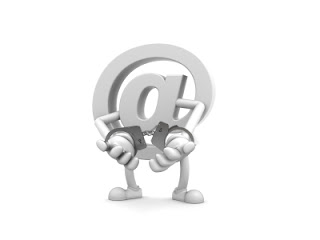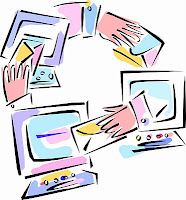 Little wonder we suffer from chronic email overload when you consider how much email is flying around and how short is out attention spam. This blog was prompted by those of two esteemed colleagues (Michael Osterman and Marsha Egan) and our recent survey on expectations of fast response.
Little wonder we suffer from chronic email overload when you consider how much email is flying around and how short is out attention spam. This blog was prompted by those of two esteemed colleagues (Michael Osterman and Marsha Egan) and our recent survey on expectations of fast response.
Just how much email traffic is flowing around? Here is some recent data from a mixture of resources including our own data and that of Radicati’s new email survey.
Little wonder many feel chained to their inbox. They must check and answer each email as it arrives rather than wait and take a more measured less stressful approach.
We can easily change our own email behaviour. Changing that of others is harder. Last week’s tips focused on changing the organisations email culture. More again this week in the light of these figures.
Do you feel overload and stressed by the volume of email and unrealistic expectations about how quickly you will respond? How to you counter balance this ever faster pace of life and short attention spans?
Tags: email best practice, email management, email overload

Email overload often seduces us into replying in haste and then trying to delete the said email from ours and the recipients inbox.
Whether an email is deleted – inadvertently or intentionally – the good (or perhaps bad) news is that it can almost always be recovered.
For example, you’ll know that if you delete an email in Outlook, it will go into the Deleted Items folder, but even deleting an item from this folder does not actually delete it. You can still recover it (albeit within a more limited time-frame) using the Outlook Recover Deleted Items option.
The deletion of items held in this service (termed the Dumpster) is managed as a central function. For example, a permanent deletion may be configured to take effect after say 28 days or longer, giving you a window for retrieval.
But, the fact is, even if an email is permanently deleted from Exchange it will still exist in many different places, including:
Just like your Facebook profile, once an email has been sent, it is forever somewhere in the ether.
Some IT teams might choose not to expend effort in retrieving an email confirming your extra day’s holiday for you. However you can bet that a LOT of effort will be spent on recovering email that shouldn’t have been sent in the first place.
For more information about how we can help you see our website at www.essential.co.uk
Keith Quinn, CEO, Essential Computing.
Tags: email archiving, email best practice
Email chains are a major cause of email overload. You know the symptoms:

Then there is the corollary – people who feel left out and feel they should be included. Take a look and see what percentage of the emails in your inbox relate to a thread/chain? How many of the iterations do you really need? Probably less then 25%. Little wonder email overload is on the increase.
Email chains seem to be the bane of most people’s life at the inbox. There are several ways to manage these more successfully which range from personal email management techniques to better use of the software. Here are the top three, some of which were in our October 2011 ‘ebriefing’ on tips to help you overcome email overload and use brilliant email etiquette to save time.
The key is to stop the email chain once it gets out of hand and re-assess just what you are trying to achieve and who really needs to make an input.
During the week there will be more tips on managing email chains.
Tags: email best practice, email chains, email overload
The ‘Gove email-gate’ media disaster looms large. Micheal Gove is being accused of using a personal email account for Government business. Is it a breach of the law? Is it right or wrong to use a personal email account to transact Government business?
It has long been a serious concern for senior civil servants that MPs (and local Councillors) forward email to their personal email accounts. Interestingly, the concerns have normally focused on breaches of security rather than the FoI Act. Whether Mr Gove is breaching the law will depend on the terms of the Education Department’s computer acceptable usage policy (AUP) and whether or not he is bound by then (as in has he read and agreed to them). What is of concern is that he like others before him still have not learnt the lesson from other high profile email disasters and continue to put in an email communications which would be far better conveyed by other means such as a conversation.
If you don’t want the press to see what you have said – don’t put it in an email. It is that simple.
MPs and Councillors are notorious for their misuse of email and landing themselves and their Departments and Councils in trouble (think of Jo Moore and ‘a good time to bury bad news’). They can never make the time to attend any email best practice education session which might save them and their organisations significant time and money.
Now we are about to witness yet another waste of public time and money over the ‘Gove email-gate’ disaster.
Tags: email best practice, email security, Government cuts
Managing Email Overload and using brilliant email etiquette can save you up to one hour a day. We have posted many blogs about how to reclaim this extra hour. Last week we spoke and exhibited at the very successful Office* 2011. Attendance was up by 18% on the inaugural show last year.
We asked visitors to our stand and participants at our Brilliant Email Master Classs what they would do with an extra hour a day. Here are the top five responses;
1. Sleep
2. Go to the gym
3. Pamper myself (eg have a manicure)
4. Go home early
5. Meet friends for coffee
In this current era of self-indulgence and me, me, me there was one respone which was top of our list. It was ‘I’d like to dedicate it to me time, but rather than take, I would give back (my time) to charity.’ We all have different pressures on us and perhaps not all of us has that extra, extra time to give back.
However, whatever your choice it is clear that if we could all spend a little less time chained to our inbox by managing the email overload a little better we could lead slightly healthier lives.
My thanks to everyone who participated in this survey. What would you do with a spare hour a day?
Tags: email best practice, email etiquette, email overload